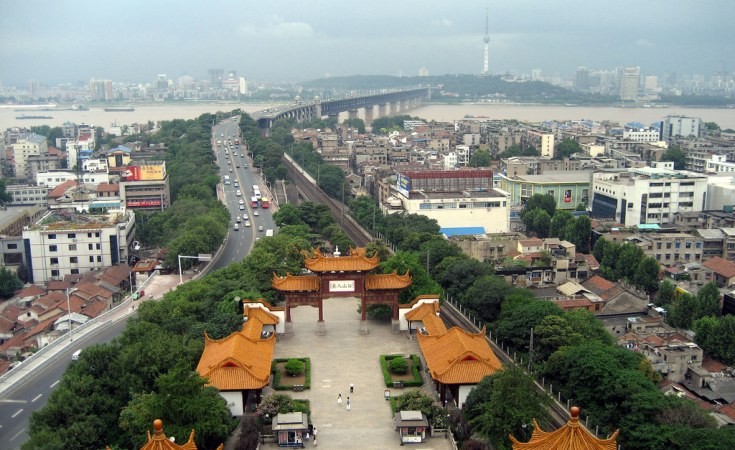Almost 5,000 Africans study in Wuhan. Running short of cash and food, many are demanding to be airlifted home. But most African nations have ruled out evacuating their citizens.
Nigerian student Abdul Salam Aji Suleiman says he’s hardly left his apartment for the past two weeks. He’s studying in Wuhan, a city of 11 million which is at the center of the coronavirus outbreak. Wuhan has been locked down since late January and now Suleiman only goes out when it’s absolutely necessary, such as to buy food.
“Before we go out, we have to wear these really good masks to cover the nose and mouth,” Suleiman, a student at Huazhong University, told DW.
He wishes the Nigerian Embassy would get him and other Nigerians out of China.
“That’s the feeling of all Nigerians who live here – they want to go home because they’re scared of the virus,” he says.
More than a dozen countries around the world have evacuated, or have plans to evacuate, their nationals from the virus-hit city.
More than 160 Moroccans arrived home last Sunday in an evacuation operation that will see them quarantined under medical supervision in two military hospitals for around 20 days.
Algeria has also airlifted out Algerians, Tunisians and Libyan citizens.
Kenya announces evacuation plans
On Wednesday, Kenya’s President Uhuru Kenyatta said his country is preparing to evacuate Kenyan students trapped in Wuhan.
“We are also working, because we have got a good number of our students there, to see how we can support them and find out how we can … ensure that they are put in quarantine for the required 14 days and ensure that they are not going to spread that virus around,” Kenyatta was quoted as saying by Daily Nation, a Kenyan news outlet.
So far, Kenya is the only country from sub-Saharan Africa that has announced plans to evacuate nationals.
Senegalese President Macky Sall said earlier this week that Senegal couldn’t match “big countries” in organizing emergency evacuations, pointing to the charter flights, medical personnel and quarantine facilities necessary for such an operation.
“We are in contact with the students and we are able to support them financially,” said Sall. “But repatriation is not so easy.”
On Wednesday, the families of 13 Senegalese studying in Wuhan demanded that the students be airlifted to safety.
“Our children demand a minimum, their right to be rescued by their motherland,” said Yoro Ba, representing the families, at a news conference in Dakar.
No money, no food
The area around Wuhan has been cordoned off. The metropolis is now a quarantined ghost town. Public transport is shut down, most stores and supermarkets are closed, and the cost of some food products has increased tenfold.
The skyrocketing prices are making life even more difficult for the African students.
Seidou Keita, one of around 20 students from Guinea living in Wuhan, says that if his government can’t bring them home, it should at least provide financial support. With banks closed in Wuhan, relatives can’t even send money to help them out, Keita explained.
“We’ve nearly run out of cash. Other Guineans here have shared their money with us to get us through the past few days.
Masters student Nankouman Kieta added that the Guinean students had almost run out of food. “The situation is quite difficult at the moment,” he said.
Guinea’s embassy in Beijing has asked the students to be patient, he said.
A 20-year-old computer science student from Ethiopia also told DW she wants to return home. Although she’s in good health, it’s hard being cooped up inside.
“Because of the spread of the disease, we can’t go out,” she told DW. “Fortunately, we don’t have any health problems at the moment. But for how long can you sit in a closed room? Let us return to our country!”
Fears coronavirus could wreak havoc in Africa
Africa hasn’t yet had a confirmed case of coronavirus.
Ghana, however, reported on Thursday two suspected cases in foreign nations, a Chinese and an Argentine citizen, according to Ghanaian media.
The two presented themselves to a hospital in Accra on Wednesday and authorities have sent off samples for further analysis, local media reported.
“They’ve all developed some symptoms that fit the case definition [but] it doesn’t mean they have the disease,” Pulse online, quoted Dr Winifred Baah from the Ghana Medical Association as saying.
Ethiopia, Kenya, Ivory Coast and Botswana have also reported suspected cases; however, subsequent tests came back negative.
Africa and China have a many links. But seven out of eight African airlines with flights to China have discontinued these routes, the most recent being Air Algerie.
Only Ethiopian Airlines is continuing to operate its regular services of 35 flights a week to five Chinese cities: Beijing, Shanghai, Guangzhou, Chengdu and Hong Kong.
Lessons learned from Ebola?
At a press conference in Geneva on Monday, WHO Director General Tedros Adhanom Ghebreyesus compared the situation to the Ebola outbreak in DR Congo. Both epidemics showed the importance of being prepared instead of panicking.
“The [Ebola] outbreak has been steadily declining,” he said. “This is an incredible public triumph. Five years ago, we had no vaccine and no therapies for Ebola. Now we can say, Ebola is preventable and treatable.”
But although many African countries have learned from the Ebola crisis and developed early warning systems, WHO has said it is concerned about the virus entering countries with weak health care systems, as is the case in many African nations.
Virologist Ndongo Dia from the Pasteur Institute in Dakar says the most important thing is being able to quickly determine whether someone has contracted the new virus.
She thinks Senegal, at least, is well-prepared.
“We have already succeeded in meeting this challenge. We have everything we need,” she said.
ALL AFRICA

